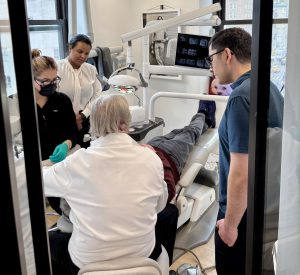Dr. Luisa Borrell, professor at the CUNY Graduate School of Public Health and Health Policy, researches the effect of parental race and ethnicity on adverse birth outcomes in New York City. New findings published in the American Journal of Public Health provide important information about the association between paternal race and ethnicity and birth outcomes.
Racial and ethnic disparities in birth outcomes are well documented in the United States, and Black women have fared the worst. While research has extensively studied the link between maternal race and ethnicity and birth outcomes, the contribution of the father’s race and ethnicity has been virtually ignored.
Dr. Borrell’s study used NYC birth and death data from 2000 to 2010 to examine whether paternal race and ethnicity had any association with adverse birth outcomes such as low birth weight, small gestational age, preterm births, and infant mortality among women in NYC.
This new research indicated that higher risks of adverse birth outcomes were associated with uncommon racial or ethnic pairings among the parents – Asian men with White, Black, and Hispanic women; and Asian women with Black and Hispanic men. Dr. Borrell explains that there is a lack of tolerance or acceptance for interracial relationships. This can add stress to women during pregnancy as they may experience a “double minority status” within their social environment. Dr. Borrell suggests that race and ethnicity of both parents should be considered when examining adverse birth outcomes.
Dr. Borrell explains, “Our findings suggest that although the face of America is changing as we mix and mingle every day, racism is alive and well in our society, and actually, appears to be resurfaced in unexpected ways, shades, and places.”
More on this important research can be found in a recent interview with Dr. Borrell conducted by MedicalResearch.com.




